Episodes
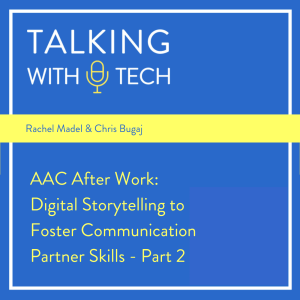
Wednesday Feb 03, 2021
Wednesday Feb 03, 2021
In part II of their AAC After Work presentation, Rachel and Chris do a deeper dive into storytelling with digital tools, aka digital storytelling. They go over all the different ways that digital tools can support storytelling and how we can use storytelling as a way to stimulate communication, support literacy, and teach core words! They also discuss “pre-story brainstorming” where you discuss the setting, characters, and problem/solution with an AAC user before you begin to create the story.
Before part 2, Chris shares about an eye gaze user who he was asked to help support as part of a school team. Previously, the parent was programming a unique page of vocabulary for every story the AAC user was going to read so the user could participate by answering questions. There was also a limited number of icons on each page of the user's screen. Chris shares about how he worked with the family to increase the number of symbols/vocabulary on the screen after they discovered the student was able to target icons really well. He then discusses changes they made to the implantation strategy (e.g. descriptive teaching) so the student didn’t need a newly programmed vocabulary page all the time .
Key digital tools discussed this week:
🔑 http://www.mystoryapp.org - allows students to create stories with pictures, stickers, describing words, and more.
🔑 Character generators (heroforge.com, peanutizeme.com, bitmoji.com) let you make a visual representation of a character, including things like what the character looks like, their emotions, outfit, pose, etc. You can then take a screenshot of the character and put that into a storytelling app.
🔑 storyboardthat.com - allows you to create comic-like storyboards.
🔑 picmonkey.com - drag words, icons, and more on top of digital images.
🔑 thinglink.com - create a story around a single image by adding hyperlinks to the image.
🔑 Edpuzzle.com - search for any youtube video and it allows you to add prompts/questions. Send videos to families for carry over practice - you can tell the family what to model as they are watching the video.
🔑 Loom.com - screen record or take a video of yourself that you can share with others, including ideas and feedback for communication partners.
Help us develop new content and keep the podcast going strong! Support our podcast at patreon.com/talkingwithtech!
Visit talkingwithtech.org to access previous episodes, resources, and CEU credits that you can earn for listening to TWT episodes!
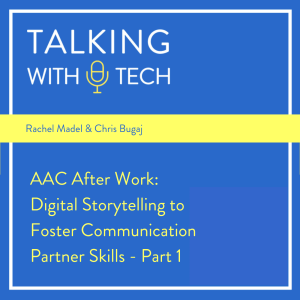
Wednesday Jan 27, 2021
Wednesday Jan 27, 2021
This week, we present the first half of Chris and Rachel’s previous webinar from the AAC after Work conference that focused on digital storytelling. This week’s portion provides an overview of AAC strategies, including expansion, core/fringe/personal core words, “stimming” on devices, using apps to support language, and more!
Before the interview, Chris and Rachel talk about how to deal with the awkwardness of taking a coaching approach with fellow clinicians who need help with AAC. Often, people expect a consulting approach where the “expert” solves their problem, but we know that a coaching approach utilizing reflective questions can help people come to conclusions on their own and they can have their own revelations. When other clinicians are asking for help, that can be really vulnerable and being asked questions might not be what they expect. We all need to remember to have a growth mindset - its more important to be able to learn new information and to know how to go and get it than it is to know every answer already.
Key ideas this week:
🔑 Expansion is all about taking language an AAC user has communicated and going up one more step. When teaching a child how to walk up the stairs, you don’t yell down at them from the top, you are next to them and showing them what is coming next. Similarly, with language, we want to meet an AAC user where they are at and go to the next level. For example, if they say “on” we can expand that and say “turn on” back to them.
🔑 Treat multiple button presses on a device ( aka “stimming”) with a “yes, and” approach like actors do in an improv comedy act. Interpret the button presses as something they meant to say on the device and expand upon that with them whenever possible.
🔑 When using apps to support language, co-view the app together rather than just putting the app in front of the AAC user. Have them communicate what they want to see happen in the app to promote more communication, e.g., “what clothes do you want me to put on this character?”.
ATIA - AT Connected will take place this year Jan 25-28th and Feb 1-4th. There will be more than 150 courses covering AAC, Assistive Technology, Education, and more. Registrations options include full conference, single strand, one day, and even a free option! Go to atia.org/talkingwithtech and enter registration code ATIAVISION21 for 20% off of the full registration! Also, don’t forget to check out Rachel & Chris virtual seminar at ATIA on Jan 30th and Feb 6th at bit.ly/TWTATIA21
Help us develop new content and keep the podcast going strong! Support our podcast at patreon.com/talkingwithtech!
Visit talkingwithtech.org to access previous episodes, resources, and CEU credits that you can earn for listening to TWT episodes!
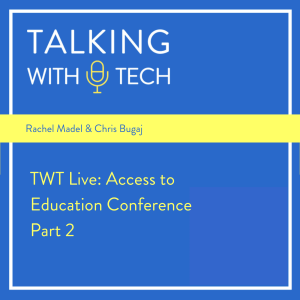
Wednesday Jan 20, 2021
Wednesday Jan 20, 2021
This week, we share Part 2 of the TWT Live from the Access to Education Conference with Chris and Rachel! In this TWT Live, there are lots of useful tips and tricks, including ideas for motivating communication partners to model AAC!
Before the live session, Chris shares about working with a computer science supervisor in his school district to combine AAC with computer science in the classroom. Chris describes how they trained the instructional facilitators who work with teachers to teach core words and block coding together. Chris and Rachel discuss the importance of enthusiasm and why projects like this are so important to fuel you to move forward!
Key ideas this week:
🔑 When trying to motivate teachers and staff to model more often, ask reflective questions and get insights into the struggles that she or he experiences with the AAC user. This can build rapport and lead to the brainstorming of ideas that have a better chance of being implemented.
🔑 Even if a student has moved from primarily being an AAC user to being more verbal, don’t take the device away from him or her automatically (if they still want to use it). That student can be a great peer communicator for other AAC users, and they may want to use AAC instead of verbal speech in some situations.
🔑 Don’t always assume that a student is “stimming” on a device when they’re pushing buttons seemingly at random. Sometimes there is communicative intent that we do not yet understand. If the student has true stim-like behaviors on a device, we can try and shope it to be more functional. We can also tell a social story to help them see how the stimming makes others feel.
ATIA - AT Connected will take place this year Jan 25-28th and Feb 1-4th. There will be more than 150 courses covering AAC, Assistive Technology, Education, and more. Registrations options include full conference, single strand, one day, and even a free option! Go to atia.org/talkingwithtech and enter registration code ATIAVISION21 for 20% off of the full registration! Also, don’t forget to check out Rachel & Chris virtual seminar at ATIA on Jan 30th and Feb 6th at bit.ly/TWTATIA21
Help us develop new content and keep the podcast going strong! Support our podcast at patreon.com/talkingwithtech!
Visit talkingwithtech.org to access previous episodes, resources, and CEU credits that you can earn for listening to TWT episodes!
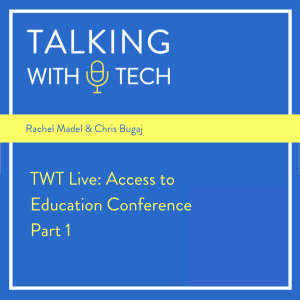
Wednesday Jan 13, 2021
Wednesday Jan 13, 2021
This week, we present part 1 of TWT Live: Access to Education Conference 2020! Before the TWT Live session, Chris and Rachel briefly discuss the importance of using captions, both as a tool to learn to read and to support people who are hard of hearing. There are many small tweaks we can make to make things more inclusive, such as enabling a feature on iPhones that allows captions to be turned on automatically when they are available.
Key ideas shared this week:
🔑 If you start with PECS, are you considering what that person will use as an adult? PECS often isn’t a good long-term robust solution compared to something like a high-tech AAC device. Its OK to use many different kinds of AAC but you want a primary method of communication that is robust and can grow with the user.
🔑 Virtual learning is a great opportunity to coach family members and communication partners. Service providers can change every year but the family will often be a consistent source of communication and support for the user over the years.
🔑 Look beyond your own discipline for professional development. There are trainings (e.g. cognitive coaching, difficult conversations) that apply to working with AAC but are not listed under the umbrella of education, speech pathology, or AAC.
ATIA - AT Connected will take place this year Jan 25-28th and Feb 1-4th. There will be more than 150 courses covering AAC, Assistive Technology, Education, and more. Registrations options include full conference, single strand, one day, and even a free option! Go to atia.org/talkingwithtech and enter registration code ATIAVISION21 for 20% off of the full registration! Also, don’t forget to check out Rachel & Chris virtual seminar at ATIA on Jan 30th and Feb 6th at bit.ly/TWTATIA21
Help us develop new content and keep the podcast going strong! Support our podcast at patreon.com/talkingwithtech!
Visit talkingwithtech.org to access previous episodes, resources, and CEU credits that you can earn for listening to TWT episodes!
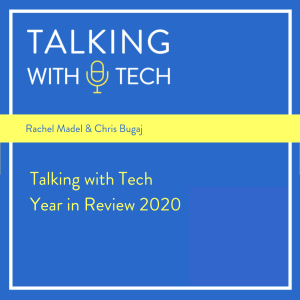
Wednesday Jan 06, 2021
Wednesday Jan 06, 2021
This week, Chris and Rachel review highlights of the Talking with Tech podcast during 2020. They talk about which countries listened the most to the podcast, the ways the podcast grew in 2020, and a breakdown of the most downloaded episodes of the year and of all time!
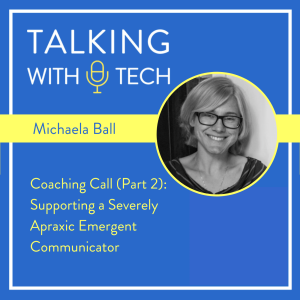
Wednesday Dec 16, 2020
Wednesday Dec 16, 2020
This week, we continue with part 2 of Chris and Rachel’s coaching call with TWT’s Audio Engineer & SLP grad student, Michaela Ball! Michaela continues to discuss her severely apraxic student who is a multi-modal communicator with Rachel and Chris. They continue to explore the importance of picking a larger iPad when possible, ways to promote direct selection skills, choosing motivating vocabulary to start with, and how to train staff and communication partners.
Before the interview, Chris and Rachel discuss the “Pygmalion effect” and the ways that belief in someone can promote greater performance from that person. This includes the Rosenthal experiments in mice, in which mice who were labeled “intelligent” actually performed better. Experiments with students also indicate that belief in the student promotes better performance on average. This supports the idea that “presuming potential” can actually improve the performance of those we work with.
Key ideas this week:
🔑 Visual supports help all students, especially early learners, Consider a classroom approach to aided language input so that everyone gets more practice with core words and how to use them.
🔑 Consider putting core words into other places like the playground. For example, you can laminate key rings or core boards and place them on the playground for any kid to use and engage with.
🔑 If teaching action words like “go”, instead of having adults model demands on the AAC user with that word, try having the AAC user make demands of others in a fun way, like in “red light, green light”.
🔑 When an AAC user communicates in multiple modalities, whenever possible, avoid “double demands” by communication partners, e.g. saying it verbally and then on the device. It is better to accept what they said and model without expectation.
To get 20% off registration for the virtual conference ATIA 2021, go to ATIA.org/talkingwithtech and enter code ATIA21VISION (in all caps). Chris and Rachel will teach virtual seminar Jan 30th and February 6th - check it out at bit.ly/twtatia2021!
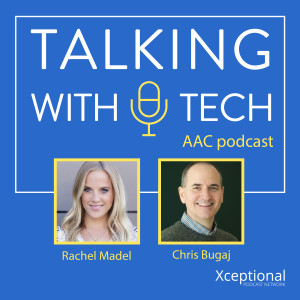
Wednesday Dec 09, 2020
Wednesday Dec 09, 2020
This week, we share a coaching call between Chris, Rachel, and our amazing Audio Engineer & SLP grad student, Michael Ball! Michaela asks the TWT team about a severely apraxic student she is working with who is a multi-modal communicator. With limited therapy time with this student, should Michaela focus more of her time on implementing a device, using sign language, or promoting verbal speech? How can she promote AAC best during the school day?
Before the interview, Rachel shares with Chris about a another apraxic student she recently consulted with. Rachel talks about her approach to the difficult conversations that occur when a family is wary of AAC and holding out hope for verbal speech without AAC. Chris poses the option of bringing in more experienced families of AAC users to talk with the new client's family about the benefits of AAC. Chris also brings up the argument that AAC can often be the “lest dangerous option”, especially when compared to doing nothing differently.
Key ideas this week:
🔑 When someone communicates in several different modalities, and we have to prioritize which modality to support, one good question to consider is “what modality will be most understood by unfamiliar listeners down the road?”
🔑 When we are choosing what word to target first when working with an AAC user, it can be helpful to choose a word that is both really motivating to them in particular and one that he or she will use in many different contexts.
🔑 When choosing between an iPad mini or a full-sized iPad for AAC, it is important to consider the extra “real estate” that the full-sized iPad screen can give. More space often means for more symbols! It can also mean more space between the symbols, which can help students with fine motor challenges.
Help us develop new content and keep the podcast going strong! Support our podcast at patreon.com/talkingwithtech!
Visit talkingwithtech.org to access previous episodes, resources, and CEU credits that you can earn for listening to TWT episodes!
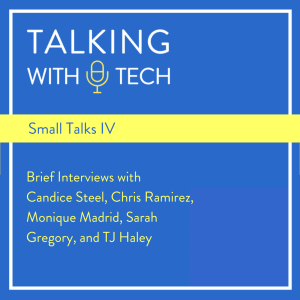
Thursday Dec 03, 2020
Thursday Dec 03, 2020
This week, TWT presents four more short interviews, aka "small talks", covering a variety of topics related to AAC and Assistive Technology!
Before the interviews, Rachel talks about a contentious IEP she recently attended for a student she consults with. Rachel had some ideas about supporting literacy that she shared with the team, but the team was resistant to Rachel’s input as an SLP and didn’t seem interested in changing any goals. Chris shares about a situation early in his career where he was told SLPs “don’t do reading” - but those same people couldn’t say who was responsible for helping the student succeed. Chris then connects this to ASHA’s perspective that reading falls under the scope of practice for SLPs. Rachel touches on some of the mistakes that are often made when teaching a minimally verbal student to read, presumably because teachers don’t know how to support a student’s reading effectively if he or she can’t read out loud.
This week's Small Talks are:
🔑 Candice Steel, an SLP & AT specialist working for Gompers, a non-profit in AZ, talks about empowering paraprofessionals to support AAC. Her training focuses on concepts like core vocabulary, operational competence, evaluative feedback, and communication facilitation. You can email her to learn more at empoweringparas101@gmail.com.
🔑 Chris Ramirez & Monique Madrid are SLPAs who work with young children, AAC, and home health. Monique shares about being a parent of a child with autism and introducing AAC to her daughter. Chris talks about working with bilingual families and working with a supervisor who supervises SLPAs from out-of-state.
🔑 Sarah Gregory, SLP and AAC specialist, talks about the benefits of using Seesaw and videos to connect with families and teachers. Sarah likes to take videos and share them with families, including videos of students (with permission) that she shares with families. With Seesaw you don’t have have everyone’s email address to be able to contact them instantly.
🔑 TJ Haley - high school SLPA who discusses ways to engage students, including augmented reality. You can broadcast augmented reality for groups and classes using software that is often free and easy to use. He finds augmented reality is a great way to elicit expressive language. Sketch Fab and Jig Space are two apps he uses.
Do you have burning AAC questions for Chris and Rachel? Sign up for our Patreon at patreon.com/talkingwithtech and join our TWT Live show for Patreon members only on December 9th 7:30-8:30 pm Eastern Time (4:30-5:30 pm Pacfic)!
Visit talkingwithtech.org to access previous episodes, resources, and CEU credits that you can earn for listening to TWT episodes!
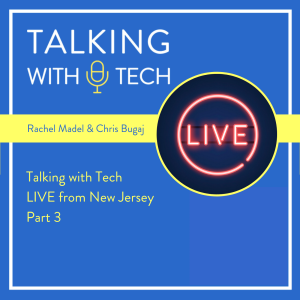
Thursday Nov 26, 2020
Thursday Nov 26, 2020
This week, we present the final episode in our three part series of TWT Live from New Jersey! This week, Rachel, Chris, and the participants tackle user questions about using eye gaze during teletherapy, how to decide if social media is accessible, maintaining attention and motivation during virtual sessions, and the language-system-first approach to AAC.
Before Part 3, Rachel and Chris get a tutorial on the popular video game Among Us! Rachel and Chris discuss how concepts from this game could be used to make therapy more fun and to work on vocabulary.
Key ideas this week:
🔑 Consider incorporating sensory movement breaks into virtual therapy to make therapy sessions more engaging. You can also incorporate a direct therapy hybrid where you include some coaching for communication partners during the session.
🔑 Using less technology and more physical items , like a puppet or toy, during a teletherapy session can make a session more interesting for some students. Check out @thespeakbotique on Instagram for ideas. (https://www.instagram.com/thespeakboutique/)
🔑 Incorporating items from the child’s environment and helping parents participate in therapy can be more useful for generalization and motivation then engaging them with our therapy items.
Help us develop new content and keep the podcast going strong! Support our podcast at patreon.com/talkingwithtech!
Visit talkingwithtech.org to access previous episodes, resources, and CEU credits that you can earn for listening to TWT episodes!
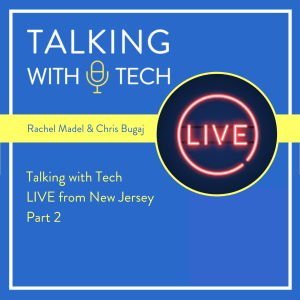
Wednesday Nov 18, 2020
Wednesday Nov 18, 2020
This week, we share Part 2 of Chris and Rachel’s “crowd-sourced” TWT Live from New Jersey! To listen to part 1, click here (https://www.talkingwithtech.org/episodes/twt-live-nj-1) . In Part 2, they discuss coaching vs consulting, how to pursue a job as an AAC facilitator in a school district, and how to increase support for high-tech AAC devices among ABAs who would rather use PECS.
Before Part 2 of TWT Live, Chris and Rachel talk about an independent evaluation Rachel recently did for a school district that ended up with a student who was a good candidate for high-tech AAC put on a 90-day trial to determine if the student was a good candidate for AAC. Rachel shares her fears that the student will not get enough training to show her capabilities, and that they won’t use the device in motivating ways. She notes how hard it can be to do an assessment without being able to work the with the student after that.
Key ideas this week:
🔑 If you force someone to use a device to communicate, they will probably reject what you are forcing them to do. We need to change the “I am the instructor, you do what I say” mindset in education to better motivate students to learn and grow.
🔑 Coaching AAC users and their circle of support is best when it “holds up a mirror” by asking reflective questions to lead others to their own answers. This leads to better internal motivation. Watch videos of yourself coaching to see how much you consult vs. coach.
🔑 If you want to work in the area of AAC and you are waiting until you feel totally prepared to be an AAC Specialist, you might never get started. You can coach, implement, and share AAC resources with others no matter what your title. Districts often want to see you know how to find the correct information rather than that you know everything there is to know about AAC already.
Have some great questions for our team? Join our Patreon group now at patreon.com/talkingwithtech to participate in our next edition of TWT Live on December 9th!
Visit talkingwithtech.org to access previous episodes, resources, and CEU credits that you can earn for listening to TWT episodes!
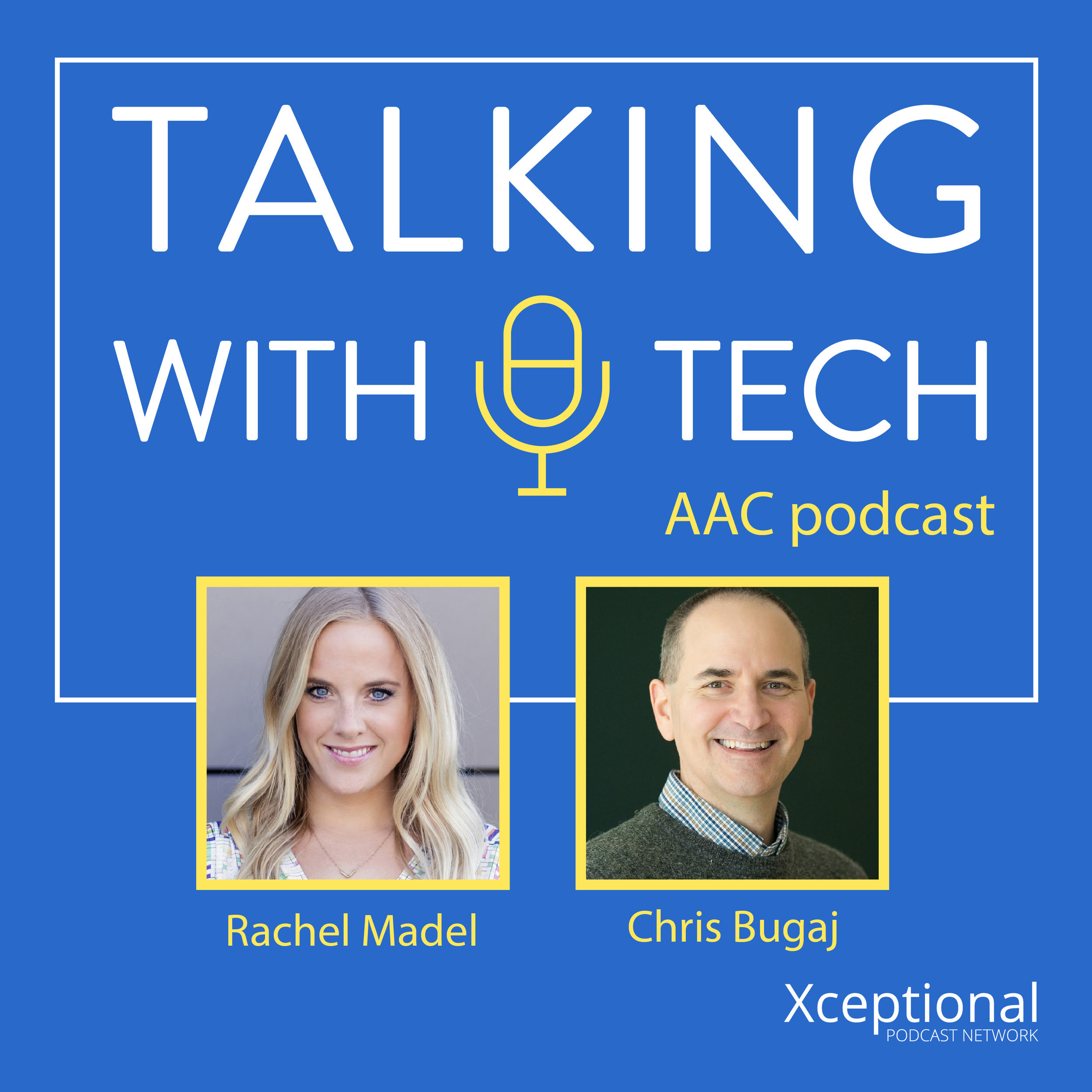
Join AAC experts Rachel Madel and Chris Bugaj as they dive into a weekly discussion about all things AAC (Augmentative and Alternative Communication). Every episode they deliver practical resources, clinical guidelines and relevant research to help clinicians better utilize technology for individuals with complex communication needs.
Episodes include interviews with industry thought-leaders, clinicians, parents, researchers and app developers to keep you on the pulse of the educational technology scene and better support communication through the use of technology.


